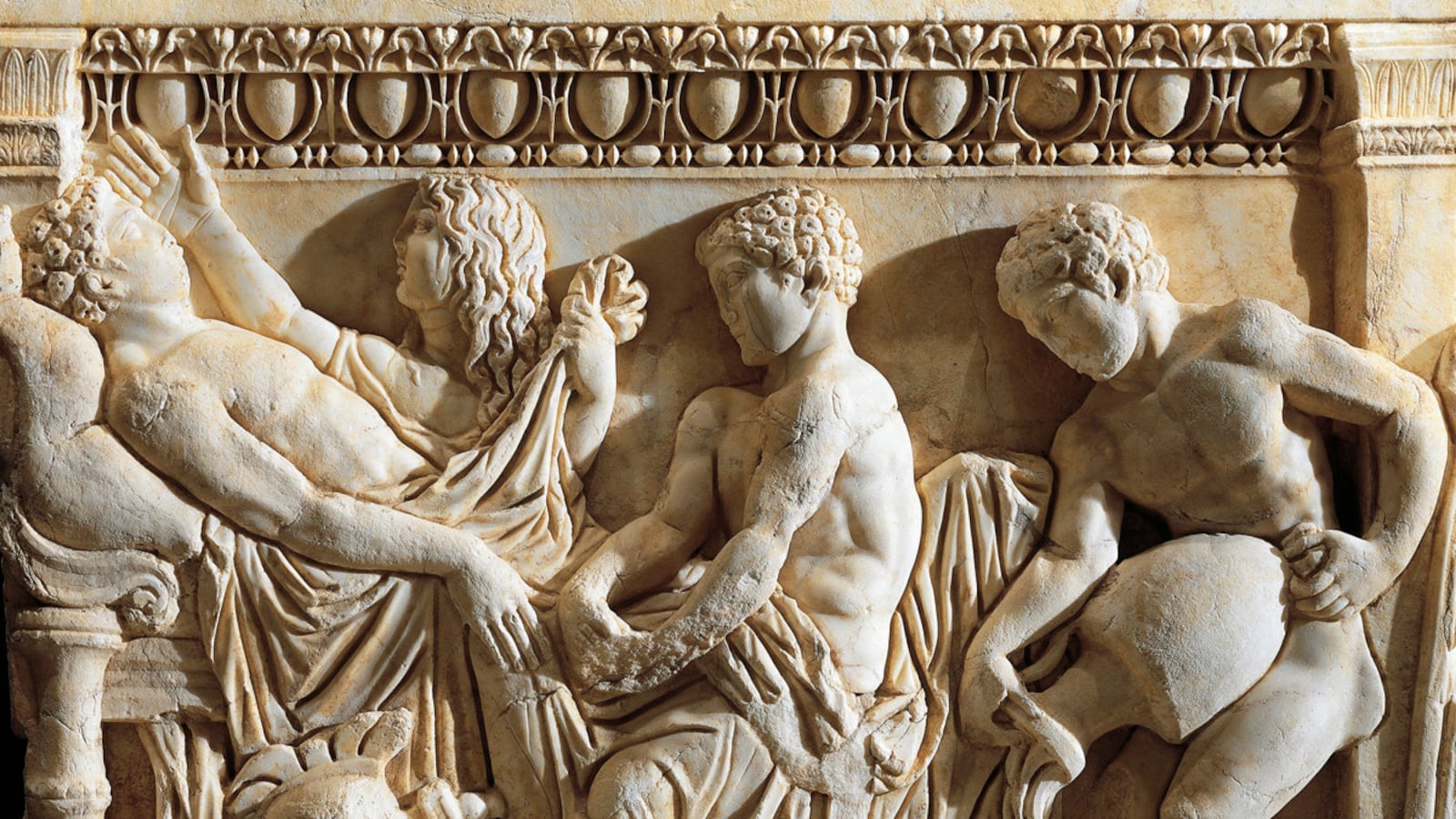Madeline Miller’s lyrical first novel, The Song of Achilles, is a love story told from the viewpoint of Patroclus, a relatively minor character in The Iliad, yet the tragic fulcrum of the Trojan War. (Patroclus dons Achilles’s armor and is killed by Hector, the great warrior Achilles returns to battle, changing the course of the war and earning eternal fame.)
“I have always been incredibly moved by Achilles’ volcanic grief and rage over the loss of Patroclus,” Miller said. “Its intensity is shocking, and also mysterious, because we see so little of their relationship. I wanted to explore who this man was and what he had meant to Achilles that he would be so lost without him.”
When I met Miller at a luncheon at Periyali (where else?), she described how she had been enthralled by the classics since childhood. Her mother read her the Greek myths when she was five. “My favorites were always the Trojan War myths, but I also loved the myths of Bellerophon, Daedalus and Icarus, Arachne, and Orpheus and Eurydice,” she said. Miller studied Latin and Ancient Greek at Brown (B.A. and M.A.) and even did a stint in the dramaturgy department at the Yale School of Drama, studying how to adapt classical texts to modern forms. Now based in Cambridge, Mass., she has been teaching Latin and Greek language since finishing graduate school, while she was writing The Song of Achilles.
Homer was her biggest source for the novel, but she also drew upon Euripides, Aeschylus, Sophocles, Virgil, Ovid, and some mythographers, like Apollodorus. “All the major events of the story are taken from the mythology, but the minor incidents, and the emotional arc of the story were my own,” she said. “I saw myself as providing the connective tissue between Homer’s bones. Homer tells us the end of Patroclus’ life, but I wanted to tell the beginning.”

Miller built upon snippets of text describing Patroclus’ early life. As mentioned late in The Iliad, Patroclus killed another boy and was sent into exile at Achilles’ father’s court. But aside from that, she said, there are basically no sources about Patroclus’ life before the Trojan War. “The myths do tell us that Achilles and Patroclus were close and constant companions from childhood, so it seemed natural to me that he would be present for all of Achilles’ pre-Troy adventures,” she said. Miller develops their companionship as adolescents, with Patroclus accompanying Achilles to his training with Chiron on Mount Pelion.
This detail, she said, was inspired by the Roman poet Statius’ Achilleid, an unfinished epic about the childhood of Achilles. “I love the centaur Chiron as a character, and was delighted that there was a source for Patroclus’ studying with him.” Statius also provided the foundation for one of her minor departures from Homer. “In the Achilleid, the boys are the same age, whereas in the Iliad it’s implied that Patroclus is older. To me, the two have always resonated as peers, so that was the tradition I followed.”
Miller also includes Patroclus in the scenes where Achilles hides out on the island of Scyros, dressed as a woman, to avoid the Trojan War, only to be tracked down by Odysseus.
How close the relationship was between Patroclus and Achilles has been debated for centuries, starting with the ancient Greeks themselves. “Homer doesn’t say whether they are or aren’t lovers,” Miller said, “but authors like Plato and Aeschylus interpreted them as such. We even have a fragment from a lost Aeschylus play where Achilles, mourning over Patroclus’ body, speaks of their "frequent kisses." Even those who didn’t believe that they were lovers, like Xenophon, acknowledged the profound depth of their bond.
“For me, Achilles’ extreme and passionate reaction to Patroclus’ death—embracing the body, refusing to bury it, asking for Patroclus’ ashes to be mixed with his own—speak of a connection that is romantic as well as companionable. I wanted to write a relationship that would be worthy of those responses.”

Our modern conception of homosexuality and heterosexualty didn’t’ really exist in the ancient world, she added. “Poets like Catullus—who wrote hundreds of passionate lines about his mistress Lesbia—also wrote poems about begging kisses from a young man. Similarly, Alexander the Great was married, but deeply devoted to his male lover Hephaestion.”
One of her greatest challenges in writing the story was finding the right voice for Patroclus. “Although I felt very strongly connected to his personality, I struggled to find his diction. I kept being tempted towards the epic register, but it never worked—Patroclus himself just wasn’t an epic person. Finally, I found my inspiration in the world of lyric poetry, whose great authors—like Sappho—write from an intensely personal and human scope.”
How would she compare the urge for fame that helped drive Achilles to Troy (after his mother, the sea nymph Thetis, prophesied that he could have a long life if he did not fight in the Trojan War, and death and eternal fame if he did fight) with celebrity culture today?
“In the ancient Greek world the focus wasn’t just on your reputation during your lifetime, but on your immortality—how your name would live on in posterity. I’m sure that there are many celebrities who are striving for that sort of long-term recognition.” Today’s celebrity culture seems more focused on “the immediate benefits of notoriety—money, luxuries, and attention. A closer comparison between the ancient ethos and the modern might be Olympic athletes, or artists, who are trying to do something that will enter the record and resonate into the future.”
And the conflict between love and fame at the heart of The Song of Achilles? “It’s a complicated issue. The two needn’t necessarily be mutually exclusive—but the kind of all-consuming fame that Achilles seeks is difficult to balance against the demands of the heart.”






